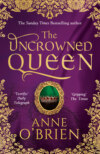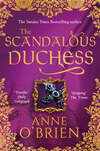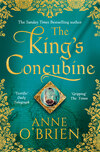Buch lesen: «Devil's Consort»
Devil’s Consort
ANNE O’BRIEN


All the characters in this book have no existence outside the imagination of the author, and have no relation whatsoever to anyone bearing the same name or names. They are not even distantly inspired by any individual known or unknown to the author, and all the incidents are pure invention.
All Rights Reserved including the right of reproduction in whole or in part in any form. This edition is published by arrangement with Harlequin Enterprises II B.V./S.à.r.l. The text of this publication or any part thereof may not be reproduced or transmitted in any form or by any means, electronic or mechanical, including photocopying, recording, storage in an information retrieval system, or otherwise, without the written permission of the publisher.
This book is sold subject to the condition that it shall not, by way of trade or otherwise, be lent, resold, hired out or otherwise circulated without the prior consent of the publisher in any form of binding or cover other than that in which it is published and without a similar condition including this condition being imposed on the subsequent purchaser.
HQ is an imprint of HarperCollinsPublishers Ltd
Published in Great Britain 2011.
HQ
1 London Bridge Street
London
SE1 9GF
© Anne O’Brien 2011
ISBN 978-1-4089-3583-5
Version: 2019-04-12
About the Author
ANNE O’BRIEN taught History in the East Riding of Yorkshire before deciding to fulfil an ambition to write historical fiction. She now lives in an eighteenth century timbered cottage with her husband in the Welsh Marches, a wild, beautiful place renowned for its black and white timbered houses, ruined castles and priories and magnificent churches. Steeped in history, famous people and bloody deeds, as well as ghosts and folklore, the Marches provide inspiration for her interest in medieval England.
Visit her at www.anneobrienbooks.com
Also by ANNE O’BRIEN
Table of Contents
Cover
About the Author
Title Page
Copyright
Dedication
Acknowledgements
Chapter One
Chapter Two
Chapter Three
Chapter Four
Chapter Five
Chapter Six
Chapter Seven
Chapter Eight
Chapter Nine
Chapter Ten
Chapter Eleven
Chapter Twelve
Chapter Thirteen
Chapter Fourteen
Chapter Fifteen
Chapter Sixteen
Chapter Seventeen
Chapter Eighteen
Chapter Nineteen
Chapter Twenty
Chapter Twenty-One
Epilogue
Other titles by the author
Extract
Read all about it…
About the Publisher
For George, as ever, with love.
And for my father, who gave me my first
love of history.
If all the world were mine From the seashore to the Rhine,
That price were not too high
To have England’s Queen lie
Close in my arms.
—Anonymous German troubadour
An incomparable woman … whose ability was the admiration of her age.
Many know what I wish none of us had known.
This same Queen in the time of her first husband went to Jerusalem.
Let no one say any more about it …
Be silent!
—Richard of Devizes


ACKNOWLEDGEMENTS:
All my thanks to my agent, Jane Judd,
who continues to be enthusiastic about
my versions of medieval history.
And to Helen and all her experts at Orphans Press,
who make my hand-drawn maps and
genealogy look splendidly professional.
CHAPTER ONE
July, 1137:
The Ombrière Palace, Bordeaux.
‘WELL, he’s come. Or at least his entourage has—I can’t see the royal banners. Aren’t you excited? What do you hope for?’
Aelith, my sister, younger than I by two years and still with the enthusiasms of a child beneath her newly developing curves, battered at me with comment and questions.
‘What I hope for is irrelevant.’ I studied the busy scene.
I had got Louis Capet whether I liked it or not.
I had thought about nothing else since my father’s deathbed decision to place me under the hand of Fat Louis—the King of France, no less—had settled my future beyond dispute. I wasn’t sure what I thought about it. Anxiety at the choice vied with a strange excitement. Queen of France? It had a weighty feel to it. I was not averse to it, although Aquitaine was far more influential than that upstart northern kingdom. I would be Duchess of Aquitaine and Queen of France. I need not inform my newly espoused husband which of the two I considered to be the more important. Although why not? Perhaps I would. I would not be disregarded in this marriage.
I was Eleanor, daughter and heir to William, the tenth Duke of Aquitaine, the eldest of my father’s children, although not born to rule. Not that I, a woman, was barred by law from the honour, unlike in the barbaric kingdom of the Franks to the north, but once I had had a younger brother who had been destined to wear the ducal coronet. He, William—every first-born son was called William—was carried off by a nameless fever, the same as relieved my mother Aenor of her timorous hold on life. Leaving me. In the seven years since then I had grown used to the idea. It was my right to rule.
But I was nervous. I did not think I had ever been nervous before: I had had no need, as my father’s heir. My lands were vast, wealthy, well governed. I had been brought up to know luxury, sophistication, the delights of music and art. I was powerful and—so they said—beautiful. As if reading my mind, my troubadour Bernart began to sing a popular verse.
He who sees her lead the dance, sees her body twist and twirl,
Can see that, in all the world, for beauty there’s no equal
Of the Queen of Joy.
I smiled. The Queen of Joy indeed. My looking glass confirmed what could be mere flattery, the greasy, self-seeking compliments of a penniless minstrel towards his patroness. But I was not ingenuous. Alone, unprotected, unwed, there would be a limit to my powers. I needed a husband with a strong sword arm, and powerful loins to get an heir on me—for him and for myself. A puissant lord who would stand with me and secure the future for Aquitaine, a man who could lead men and demand the obedience of the power-hungry lords who would snatch what was mine. A man who would be a fit mate for such as I.
Ah, but would Prince Louis fit this mould?
‘Well?’ Aelith nudged me.
‘What do I hope for? A prince, of course,’ I replied.
‘That’s no answer.’
‘A man after my own heart.’
‘Self-important?’ Leaning against the carved window ledge, Aelith ticked them off on her fingers. ‘Opinionated? Arrogant?’
But I sidestepped my sister’s chuckling malice and answered seriously enough. ‘Why not? He will rule my lands. He must do it well. He’ll not do it if he has neither the backbone nor the spirit for it. Better a man with arrogance than one who’d sell himself short to make friends. My vassals need a firm hand.’
We were standing in my bedchamber, Aelith, my women and I, high in the old keep, a spacious, graceful room with large windows to catch the light and any breath of air on this day of impossible heat. A room that I loved, full of my own possessions, and from where I could look out across the Garonne to observe the whole scene unfold hour by hour. It was July, hot as the gates of hell, and I was restless with impatience as Aelith and I observed the settlement grow. Tents, pavilions, sprouting like mushrooms, covered the open meadows, transforming them into a town in its own right. A vivid, richly-coloured Capetian town on Aquitaine soil. A foreign presence, and above it all the fleurs de lys of France. A portent for the future, I acknowledged, a French symbol of ownership over the mighty Duchy of Aquitaine. Before me, horses and armed men swarmed. Farriers and wheelwrights set up their booths and a market was soon under way. Small boats plied back and forth with Frankish noblemen or mounds of cabbages. My vassals, I was well aware, would question the relative importance of the two. It would not be a popular marriage but we would all have to live with it.
‘He must be handsome, of course,’ Aelith announced. She was already precociously aware of the male sex.
‘Of course.’ I had no thought of a husband who was less than pleasing to the eye.
‘Like Raymond.’ Aelith sighed a little.
Raymond of Poitiers, my father’s young brother, now ruling as Prince of Antioch in distant Outremer.
‘Yes. Like Raymond,’ I agreed. My only meeting with Raymond had been of the briefest, four years ago now and for a mere few weeks, but my memory of his golden beauty had not faded with time. Raymond was to my mind the epitome of the perfect knight. ‘If the French prince is in any measure like Raymond, I shall be everlastingly grateful.’ My attention was caught by a flurry of movement across the river. ‘Look! That’s the royal standard!’ I pointed. Aelith leaned to see the blue pennants with the gold lilies of France. ‘So Prince Louis is here at last.’
‘As long as he’s prettier than Fat Louis,’ she remarked.
‘I’ll give you my gold circlet if he’s not. Fat Louis is naught but a mountain of lard ridden with dysentery.’
But I knew better than to underestimate King Louis. His body might be corrupt but his mind was still keen. He might be too corpulent to rise from his bed, too obese to mount either a horse or a woman, so rumour said, but he had seen me as a gift dropped from heaven into his enormous lap.
We watched as another pavilion was erected, larger than all the rest. The Capetian banner was planted beside it to hang limply in the windless air. A group of horsemen drew up and dismounted. Impossible to make out one figure from the next at this distance.
‘They won’t like it, you know.’ I spoke softly. ‘My vassals will detest it.’
‘But they have no choice.’ Aelith pursed her lips. ‘And if the Prince keeps the brigands from our doors, they’ve no right to complain.’
True in essence, but far too simplistic.
Was this, this Frankish marriage, what the Duke my father had intended when he had placed me into King Louis’s keeping? Arrange a marriage for my daughter, he had left instructions for Louis as his life drained from him on the pilgrim’s road to Santiago de Compostela in Spain. And do it fast, before rebellion can take hold. Until that time, I give her and Aquitaine into French safe hands.
What was my father, Duke William the Tenth of Aquitaine, thinking? Surely he’d understood that King Louis would never allow me to escape from his fat fingers. It would be like expecting a fox to show goodwill by keeping out of the hen coop even though the door was left invitingly open, and the King of France was no kindly fox. Arrange a fast marriage for me? By God, he had. Between the vomit and the bloody flux that tied him to his bed, Fat Louis had moved heaven and earth to secure me for his son before anyone could voice a protest.
And there had been plenty. My father’s vassals may have sworn an oath of homage to me in his lifetime, but our lands were torn by unrest. The Count of Angoulême, a vassal lord of Aquitaine, was vicious in his condemnation and was not alone. They would have accepted someone like Raymond, one of their own. They would have just about tolerated a noble lord of the south who might win my hand. But not this Capetian interloper, this foreign northerner from some insignificant Frankish tribe. I knew what they would be thinking as they too watched this impressive arrival. They would see Louis Capet as a foreign power who would drain us to further his own ambitions. My father may have insisted with his final breath that Aquitaine remain independent from France, ruled separately, to be inherited in some distant future by the heir of my own body; he might have insisted that Aquitaine must not be absorbed into French territory, but how many of my vassals would remember that, when faced with this invasion of unveiled power?
‘It might have been more politic—’ I spoke my thoughts ‘—if my father had not thrown us into the hands of a Frank.’
And I marvelled at my father’s unwarranted stupidity in drinking water fouled by a horde of pilgrims, all of whom had doubtless washed and spat and pissed in its shallows. Did he not see, scooping up the bad fish, gulping the rank water, his mind taken up with the successful culmination of his pilgrimage? All he got was a night of fever, of vomiting and flux, rapidly followed by a pain-racked death before Saint James’s altar.
An excess of piety can make us all stupid.
‘Perhaps the vomiting addled his brain,’ remarked Aelith dryly.
And perhaps the outcome would be civil war. It might be like setting a brand to dry timber, insurrection sweeping through Aquitaine and Poitou before we had finished dancing at my marriage feast.
A quick wash of fear replaced the nerves and the anticipation.
Behind me the troubadour, obviously listening in, struck a strident note on a lute so that I turned to look, seeing the lifting of his brow in my direction. When I smiled in appreciation of his intent, Bernart began to sing a popular if scurrilous verse in a soft growl.
Your Frank shows mercy, just to those who can pay him,
There’s no other argument ever can sway him …
He hesitated, breath held, fingers lifted from the strings, to assess my reaction, and even though I knew what would come next, I waved him on. Bernart struck another heavy chord.
He lives in abundance, his table’s a feast,
But you mark my words, he’s a treacherous beast.
My women joined in with relish in the last line. The Franks were not well loved. A coarse, aggressive, unpolished people, compared with our Roman sophistication in Aquitaine.
‘Enough!’ I moved into their midst. ‘We’ll not be discourteous.’
‘No, lady.’ Bernart bowed over his beloved lute. ‘We’ll make our own judgement when the Prince becomes Duke of Aquitaine.’
I frowned at the smooth cynicism but could find no fault with so obvious a statement.
‘It’s an honour that he should come to you.’ Aelith still leaned her arms along the sill, unwilling to abandon the entertainment without. ‘Travelling all this way from Paris, in this heat. They say he travelled at night.’
It was true. Everything had been settled with such speed, as if the King of France had the hounds of hell baying at his heels, although what Prince Louis thought of it I had no idea. Perhaps he would have preferred a Frankish bride. I lifted my chin. I too could be cynical.
‘The Prince only came to me because his father the King instructed him to do so. Fat Louis and my guardian the Archbishop feared that if I set foot outside this palace I would be abducted by some scruffy knight with an eye to a rich wife. I’m far too valuable to be allowed to travel the breadth of the country.’ Impatience tightened its grip, now that the Prince was in my sights. ‘How long do I have to wait before I can see him?’
Aelith laughed, a pert toss of her head. ‘At least he’s old enough to play the man and not so old as to be near his grave.’
‘He’s two years older than I.’
‘Old enough to keep you in line?’
‘No.’ I didn’t like this line of humour. ‘I’ll not be a vessel merely to bequeath my royal Aquitaine blood to my children. I am no brood mare, without opinion or wit, to slave and carry at the behest of a husband. I’ll rule my own lands. The Prince must accept that.’
‘But can you protect them, lady?’ Bernart asked with grave familiarity.
Before I could reply, the Archbishop of Bordeaux, Geoffrey of Lauroux, my kindly guardian since my father’s death, was announced and entered. Resplendent in clerical robes despite the heat, he bowed, puffing from the effort of climbing the stairs.
‘Lady. The Prince is come.’
And I knew immediately what I wanted. ‘I would go out and meet with him.’
‘No.’
I thought I had misheard. ‘I wish to see the Prince. Will you arrange it, sir?’
‘Regretfully, no, lady. You will wait here.’
‘But I wish it.’ I would not be thwarted in this.
But the Archbishop remained adamant. ‘To arrive before your future husband, windblown and hot, in the middle of a camp of soldiers and the usual rabble of camp followers? Less than perfect, my dear Eleanor. I think not. You will wait here. You will allow Prince Louis to come to you. As he should, of course.’ The Archbishop’s eyes twinkled with crafty appeal to my pride. ‘The Kingdom of France cannot compare with the Duchy of Aquitaine. You will stand on your dignity. You will control your impatience.’
Dignity. Control. Maturity was rushing up to meet me, so fast that it took my breath. And I knew it must be so. The days of my wilful girlhood were gone for ever.
‘How long must I wait?’
‘Not long. Tomorrow I will bring him to you.’
Another whole day. But to ride into the Capetian camp, as any common sightseer to peer and pry … No. I would not do that.
‘Tomorrow then. We will hold an audience in the Great Chamber.’
‘I will arrange it.’ The Archbishop bowed again and departed, well satisfied, as was I.
I went back to the window, straining to see if I could make out the distant figure of my future husband. I could not, of course. My gaze strayed to the nearer, familiar vista of Bordeaux. My days here were now numbered. I would have to leave all this, my well-loved home, the dry, sun-baked south. I had known Bordeaux all my life, the warm, golden walls enclosing vineyards and gardens as well as our own ducal palace. Churches with their spires arrowing to heaven. The market and port with ships landing goods from all the known world. Paris? What did I know of it? Very little, I admitted. Landlocked. Cold and damp and northern. Whatever it was, it was about to become the centre of my new life.
‘And have you decided which language you’ll use to address your most puissant Prince?’ Aelith murmured, coming up to tuck her hand through my arm. She was definitely in the mood to annoy.
‘I shall speak my own language, of course.’
‘You’ll not make it easy for him?’
‘Why should I? He’ll gain far more from this marriage than I. Our new combined kingdom …’
‘Never mind the politics, sister. You’re too solemn. Far more important—what will you wear to meet him for the first time?’
‘Aelith! Life’s not all about dresses and mantles …’
‘Sometimes it is. Which reminds me, will you lend me your pleated undergown—the blue silk patterned with silver?’
‘No.’ It was new and precious.
‘Well, if you’re of a mind to be bad-tempered …’
It was in my mind to snap at her but I could not; marriage might demand a parting between us, a thought that brought me no happiness. Moreover she had a point. It mattered that I make an impression on Louis Capet. I would make him notice me. I was Duchess of Aquitaine, not some poor petitioner to fall on her knees to beg the Capetian hand of charity to raise her from the dust.
The Devil whispered in my ear.
Are you sure you want to be bound to a man, to be dependent on his yea or nae? Is this how you see your life—at the beck and call of this unknown prince, for you to be his vassal, his possession, obedient to his commands?
No, I didn’t want it but I had no choice. I was fifteen years old, Duchess of Aquitaine and Gascony, Countess of Poitou in my own right. Unable to defend my lands from the jackals and vultures, I must bow to the inevitable. I had made up my mind to it.
I would mate with the Devil himself if it would keep Aquitaine safe.
Aelith borrowed my undergown anyway, but by then events had overtaken me: blue silk undergowns had become entirely inconsequential.
‘You are magnificent,’ Aelith observed.
I raised my chin. I knew it. True to his word, early next morning, before the heat of the day built to a furnace, Archbishop Geoffrey had himself ferried across the river to escort the Prince to meet me, his affianced wife. I sat in my audience chamber and waited for him, a vision of Aquitaine splendour.
Aelith’s advice in mind, I had chosen a gown of deep blue. To be the possessor of hair the rich red-brown of a vixen’s pelt put many colours out of bounds, but the blue of the Virgin’s robe was becoming. Beneath it I wore under-tunics of silk and fine linen, while over it a long flowing surcoat so that the full skirts lapped around me, trailing as I walked in gilded leather shoes. A jewelled belt clipped my waist with another loop around my hips. A long transparent veil secured by a gold and jewelled filet did not hide my hair but drew attention to it, braided along its length with blue and gold ribbons to hang almost to my knees. All in all a statement of imperious power—if not entirely comfortable in the sultry heat. Attention was drawn to my eyes, to my lips and cheeks by the judicious use of artificial colour. Rings flattered my hands, earrings dripped from lobe to shoulder.
And I waited.
An hour passed.
He kept me waiting.
I was not used to being kept waiting, in a life where servants leapt to do my bidding. But I would show neither anxiety nor anger. I would not go to the wall-walk to look out. I sat on my high-backed chair on the dais and stilled my fingers that wanted to tap their impatience. I watched the door at the far end of the vast chamber. The sun lifted towards noon and sweat trickled down my spine.
Still I sat. Temper began to hum beneath my skin. He dared to keep me waiting! Me, in whose veins ran the blood of a long line of victorious warrior knights. He would slight me, Eleanor …
Where was this Prince of France? By God, I’d wait no longer …!
And then the tramp of an armed guard. The soft murmur of voices. The Frankish soldiers marched into my audience chamber—much as an invading force—to position themselves into a protective phalanx at the door. But I focused on the man who came to a halt under the arched doorway, looking around with wide eyes, only stepping forward at a murmur from my Archbishop on his right.
Louis Capet walked slowly towards me. Louis le Jeune. Now that the moment was here my palms were slick with sweat. I resisted the urge to wipe them down the silk of my skirts.
The Prince halted, as if looking for encouragement.
I studied him while he was still distant from me, gaining a fistful of impressions. My heart sank. Who would I compare him with? The only men I had known, of course. My grandfather. My father. My father’s younger brother Raymond, now Prince of Antioch. With these men as my only measuring stick, I had expected a warrior, a bold knight to march forward to claim the prize, a lord with presence, as much at home in a chamber of government as in the lists or on the battlefield. As a Prince of France I had at least anticipated a supreme confidence. When the men of my family had entered a room, it had been instantly full of their authority and forceful personality.
The lingering shades of the rulers of Aquitaine faded as Prince Louis walked forward slowly, the Archbishop once again at his side with an encouraging smile. This, then, was the man I would wed. He stopped before me, bowed with elegance and smiled. As good manners dictated, I stood and, lifting the trailing hems of my skirts, stepped from the dais and held out my hand in greeting.
Louis was tall, as tall as I, for which I was grateful. His hair was long and fair, waving to his shoulders. Blue eyes, the blue of a summer sky, were direct and almost childlike in their openness. Fine features, a straight nose and austere cheeks. His mouth was well moulded, curved into a sweet, disarming smile. He had taken a razor to his cheeks and chin, his skin soft and smooth. Without doubt, as any woman would see, an attractive man.
Will he be attractive in bed?
The thought that leapt into my mind, as silkily as my rosary beads slipped through my fingers at Mass, did not surprise me. After all, what was the purpose of this union if not to safeguard the future of my domains through the begetting of a child? Would he be pleasing? I thought he would. His shoulders were broad, his figure elegant. His hands were beautiful and slender. I would not object to intimacy with this man.
‘My lady.’ His voice was soft, pleasant to the ear as he bowed again with exquisite grace.
‘My lord, you are right welcome,’ I replied in similar Latin, the formal diplomatic language of the court.
As he bent his head to press his lips to my fingers, I assessed his clothing with some surprise. His garments were of fine wool, the best I had seen, and in the most magnificent red that I did not wear but coveted—a red-haired woman would not choose to wear such a hue unless she was totally witless—but the garment was in what I would have called an outdated fashion. The overgown reached Louis’s ankles, rather than his knees, over a plain linen under-tunic that showed at neck and hem. No bands of braiding or embroidery to enhance the collar or sleeves, only minimal stitching around the neck and that without style. He wore no jewels. His belt was of good quality but plain leather, as were his boots. He had dressed well but completely without show to draw attention to his rank.
He wore no sword at his belt. The Dukes of Aquitaine wore a sword unless in the bedchamber. And even then, until persuaded to remove it by the lady who shared their sheets.
How could the heir of France not wear a sword, the ultimate symbol of power?
I pursed my lips faintly through my smile, trying not to be over-critical. So he did not like display and ostentation. That did not make him less of a man. Perhaps as a Prince of France he saw no need to emphasise his status with sword and poignard on the day he met his intended bride. But his hands and face were pale, un-weathered. The fingers that held mine bore no calluses from sword or shield or even horse harness. He was no warrior, no fighter for sure. He bore no trace of hard campaigning through rain and sun.
Neither was he finding it easy to choose what to say next to me. An awkward little silence fell between us. Which I broke.
‘I have looked forward to this moment when we would meet, my lord,’ I said.
Louis flushed, his fair skin pink as an early rose. I saw his throat convulse as he swallowed.
‘Lady. I have heard much of your beauty. The rumours were not false. Your eyes are as fine and rare as … as emeralds.’
His flush deepened. I saw myself reflected in his eyes and knew that he was much taken with me. But that was not the reason for the ripple of surprised pleasure that stirred the fine hairs at my nape. Oh …
His flattering words were not in Latin!
How this man had courted me. And I had not at first noticed. He had gone to the considerable trouble to learn at least some words in my own language, the langue d’oc of the south, the official language of Aquitaine, rather than the langue d’oeil that Louis would speak in his Frankish kingdom.
‘You honour me,’ I murmured, failing to hide my astonishment.
‘I have tried. I learned the phrases on my journey here,’ he admitted with a soft laugh. ‘But my conversation would be limited. Perhaps we should revert to Latin. God give you good health, my lady.’
And so we slid smoothly into Latin again because we must, but the gesture to me was a fine one.
Louis kissed my fingers again, then my cheeks, enveloping me in a cloud of sweet perfume. His lips were gentle on my skin. So he had bathed and anointed himself before coming to me. My pleasure deepened.
‘Forgive me that I did not come sooner,’ Louis explained. ‘I ordered a Mass to be said. I had to give thanks to God for my safe arrival.’
‘You are certainly well protected,’ I observed, with an eye to his guards.
‘My father and Abbot Suger—my father’s chief counsellor who has accompanied me at my father’s orders—both insisted. They must guarantee my safety in dangerous territory.’
It was said completely without guile, despite the covert slur on the state of law in my lands, neither was it the reply I had expected—but, of course, his father would be concerned. ‘Of course.’ I raised my hand to indicate a table with two low chairs set for us in a window embrasure. ‘Here is wine, my lord. Please sit and be at ease.’
We sat. At a signal my servants approached to pour the wine and uncover gold dishes of candied fruits and sugared plums. Louis accepted the cup from my hand.
‘Let us drink to our union.’ I raised mine to my lips. ‘May it be long and fruitful, to the advantage of both France and Aquitaine. As sweet as the sugarplums.’ I gestured to the bowl.
‘It will be my greatest delight.’
Louis took a small sip before pushing the cup aside. He declined the sweetmeats. His gaze was fixed on my face. Again an uneasy silence fell between us.
‘What is it?’ I asked. I did not care to be stared at quite so fixedly.
He shook his head, formally grave. ‘I can’t believe my good fortune. If my brother had lived, he would have wed you. His misfortune is my gain. You are the most beautiful woman I have ever seen. How can I not love you?’



























